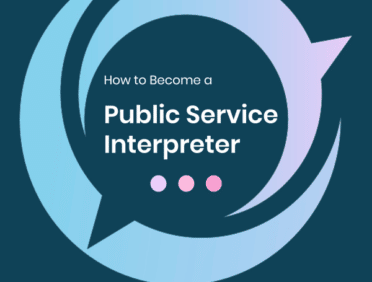Filter by
What Does a Community Interpreter Do?
Community interpreters act as linguistic bridges in community settings, promoting communication between people who speak different languages. Their purpose, whether in medical appointments, welfare procedures, social services encounters, local government, immigration or educational settings, is to promote effective and accurate communication, increasing non-English speakers’ access to critical services.
How to Become a Community Interpreter: Steps and Requirements
Starting a career as a community interpreter requires a number of procedures and qualifications. Prospective interpreters often begin by assessing their language skills and cultural competence. Formal training in certified programmes, such as the Level 3 Certificate in Community Interpreting, provides individuals with critical skills in interpreting methodologies, cultural sensitivity, and ethical principles. Registering with interpreting agencies provides access to work.
Understanding Community Interpreting Qualifications: Levels and Certifications
Community interpreting certificates, such as the Level 3 Certificate in Community Interpreting, demonstrate a high level of proficiency and ability to operate independently. These credentials encompass a variety of subjects, such as interpreting methodologies, communication skills, and legal and ethical considerations. Lower-level certificates provide fundamental information for unpaid interpreters, but advanced certifications, such as the Level 6 Diploma in Public service interpreting (DPSI), show competence and expertise in the discipline.
Workplaces and Demand for Community Interpreters
Community interpreters can work in a variety of settings, including healthcare, welfare services, social services, education, and government institutions. The heterogeneous aspect of society, as well as the commitment to ensuring fair access to services for all individuals, regardless of language or cultural background, continue to fuel demand for interpreters in various areas.
Challenges and Rewards of Community Interpreting
While community interpreting can be a rewarding career, it is not without challenges. Interpreters must negotiate intricate linguistic and cultural differences, often in high-pressure situations. However, the ability to make a concrete impact in people’s lives, promote inclusivity, and foster cross-cultural understanding makes the career extremely rewarding for many.
Community Interpreter Frequently Asked Question (FAQs)
Community interpreters in the UK play an important role in fostering efficient communication between people who speak different languages in communal contexts. Their duties cover a wide range of situations, including medical appointments, welfare processes, social services encounters, educational settings, and immigration interviews.
They offer equal access to key services and information for non-English speakers by accurately relaying communications between parties. Community interpreters work to bridge cultural divides, promote inclusivity, and protect people’s rights to linguistic assistance, as stipulated in legislation such as the Equality Act 2010 and the Human Rights Act 1998.
Becoming a community interpreter in the United Kingdom usually entails a combination of education, training, practical experience, and professional growth. Aspiring interpreters frequently begin by evaluating their language skills and cultural competence, assuring fluency in both their native language and the language(s) they intend to interpret.
They then attend formal training programmes, such as those offered by Learn Q, to gain interpreting qualifications. These programmes address important issues such as interpreting procedures, ethics, cultural sensitivity, and applicable legislation.
After qualifying, interpreters find work by registering for interpreting agencies.
The Level 3 Certificate in Community Interpreting is a comprehensive certificate that aims to provide learners with the skills and information required to function competently as interpreters in community settings.
This qualification typically includes modules on interpreting techniques (such as consecutive interpreting, paraphrasing and asking for clarification), communication skills, cultural awareness, ethics and professionalism, safeguarding principles, and relevant legal and regulatory frameworks (such as data protection laws and confidentiality requirements).
Successful completion of the Level 3 Certificate in Community Interpreting indicates a high degree of proficiency and preparedness to work independently as a community interpreter.
Community interpreters in the UK might find work in a variety of venues and areas. These could include hospitals and healthcare facilities, social assistance agencies, schools and educational institutions, immigration offices, local government departments, welfare offices, police stations, and community centres.
Interpreters mainly work as freelancers, on behalf of agencies, delivering services to individuals and organisations as needed. The demand for community interpreters goes beyond metropolitan areas, with opportunities accessible in rural areas and regions with large immigrant populations.
While being a community interpreter can be gratifying, it also presents its own set of challenges. Interpreters frequently operate in high-pressure settings where accuracy, professionalism, and confidentiality are critical. They may meet emotionally charged events, deal with sophisticated terminology, and traverse cultural differences while remaining fair and impartial.
The nature of interpreting necessitates quick thinking, strong listening skills, and the capacity to multitask efficiently, which can lead to stress. However, with proper training, support networks, and self-care techniques, many interpreters find fulfilment in their work despite the inherent difficulties.
The average income range for community interpreters in the UK varies according to experience, qualifications, language competency, and the sector in which they operate. Entry-level interpreters may make between £15 and £25 per hour, while experienced professionals or those with specialised talents may fetch rates greater than £25 per hour.
Interpreters who work in high-demand industries such as healthcare or legal services may receive better pay for their skills. Freelance interpreters may be able to set their own prices, but those engaged by agencies or organisations may be paid a fixed salary or hourly wage.
Formal qualifications are strongly advised for those wishing to work as interpreters in the UK, as it is very difficult to find paid work without them. Formal qualifications reflect a dedication to professional development, interpretive skills, and ethical standards.
Many companies and clients prefer to work with interpreters who have earned the necessary training and certifications. In the United Kingdom, common interpreting qualifications include the Level 3 Certificate in Community Interpreting, such as provided by Learn Q.
The usual hourly rate for interpreters in the UK varies depending on the type and mode of interpreting (face-to-face, phone, consecutive, simultaneous, etc.), language pair, specialisation, and geographic region. Interpreters typically receive between £15 and £40 per hour for their services.
Fees may be higher in specialised professions such as legal or medical interpreting, as well as in languages that have a lack of qualified interpreters but are in high demand. Interpreters that work outside of regular business hours or provide emergency services may charge a higher fee for their availability.
A career as an interpreter in the UK often needs a combination of education, training, language fluency, and practical experience. While there is no single path to becoming an interpreter, individuals usually pursue formal qualifications such as the Level 3 Certificate in Community Interpreting or equivalent offered by recognised institutions such as Learn Q.
Proficiency in both the interpreter’s native language and the language(s) they interpret into is essential, as is cultural competency, mastery of interpreting techniques and knowledge of relevant industry terminology. A successful interpreting career requires ongoing professional growth as well as adherence to ethical norms.
The highest-paid interpreters in the UK frequently have a combination of unusual language abilities, posess fluency of ‘rare’ language(s), specialised expertise, significant experience, and professional qualifications. They may work in high-demand fields like legal or medical interpreting, serving prestigious customers, multinational organisations, and government agencies.
High-paid interpreters may specialise in diplomatic or conference interpreting, simultaneous interpreting for large events, or unusual language combinations in high demand but low supply. Interpreters that provide specialised services such as sign language interpreting or certified translation may charge a premium for their services.
The Level 2 Certificate in Community Interpreting is an introduction certificate that equips individuals with the fundamental information and abilities required to work as voluntary (i.e. unpaid) interpreters, for example in charities. This qualification should cover vital themes such as interpreting procedures (consecutive and sight translation), communication skills, cultural awareness, ethics and professionalism, and applicable laws and regulations.
It serves as a stepping stone for those interested in becoming interpreters and may be required for higher-level credentials, such as the Level 3 Certificate in Community Interpreting.
Level 2 is not a high enough level qualification to work as an interpreter, with the minimum level being the Level 3 Certificate in Community Interpreting .
The Level 1 Certificate in Community Interpreting is intended for people who have little or no interpreting experience or proficiency and want to learn the basics. This introductory qualification covers fundamental interpreting skills, communication methods, cultural awareness, and ethical considerations.
It offers an entry point into the area of community interpreting, giving participants a solid foundation on which to grow their abilities and pursue more professional development possibilities.
There is no paid interpreting work available for holders of the Level 1 Community Interpreting, it is designed for voluntary work or a basic background only. To get paid interpreting work you must hold a Level 3 Certificate in Community Interpreting or above.
Becoming an NHS interpreter in the UK normally entails a mix of education, training, certification, and registration with recognised interpreting services. Individuals interested in working as NHS interpreters should first demonstrate competency in their original language, English, and any additional languages required for their employment. They can then pursue a related qualification, such as the Level 3 Certificate in Community Interpreting, and receive healthcare-specific training.
Before working in NHS settings, interpreters may be required to register with organisations known as Language Service Providers (LSPs), as well as pass background checks or security clearances.
The Level 3 Certificate in community Interpreting is the entry level qualification for interpreters who wish to access paid work for interpreting assignments that do not include legal specialisms (e.g. medical, welfare, social services, local government etc.).
The Level 6 Diploma in Public Service Interpreting (DPSI) is a top-tier qualification that exhibits exceptional interpreting skills and knowledge and also allows holders to access assignments with legal content including courts and the police. This certificate is intended for experienced interpreters who want to expand their abilities and knowledge in legal interpreting.
Holders of the Level 6 Diploma have often undergone considerable training, earned practical experience, and demonstrated mastery of interpreting techniques, cultural competence, and ethics.
They can perform confidently and professionally in difficult and demanding circumstances such as court procedures, police settings, and international conferences.
There are various options for gaining formal interpreting qualifications in the United Kingdom, including authorised training programmes, colleges, universities, and professional organisations such as Learn Q who provide online qualifications.
Individuals can pursue qualifications provided by recognised industry associations such as Gatehouse Awards, and the Institute of Linguists Educational Trust (IoLET). Individuals who want flexible learning alternatives or have other responsibilities may prefer to access online courses, distance learning programmes, and /or self-study materials.
Yes, there is a substantial and growing demand for interpreters in the UK across a wide range of businesses. With the country’s diversified population and multicultural society, the demand for good communication among people who speak different languages grows. Healthcare, legal services, social services, education, government, business, and community organisations all have a need for interpreters.
The UK’s commitment to equal access to services and justice for all people, regardless of language or cultural background, drives up demand for skilled interpreters.
A job as a community interpreter provides several opportunities for personal and professional development. Some compelling reasons to seek a career in interpreting include the chance to facilitate communication and understanding across diverse cultures, make a significant difference in people’s lives, work in diverse and dynamic workplaces, and contribute to social cohesion and inclusiveness.
Interpreting offers chances for lifelong learning, cultural interchange, and professional development, as well as the joy of assisting others in accessing critical services and information.
Interpreting can be a highly satisfying and fulfilling professional path for people who appreciate language, cultural interchange, and assisting others. While interpreting has its obstacles and demands, such as pressure, emotional intensity, and the need for quick thinking, many interpreters find it intellectually engaging, emotionally rewarding, and personally gratifying. The demand for interpreters is increasing, creating prospects for job security, career progression, and professional recognition.
The individual’s interests, talents, values, goals, and ambitions will determine if interpreting is a viable professional career choice.
Several characteristics or behaviours might reduce an interpreter’s efficacy and the quality of communication. These may include insufficient language competency or vocabulary knowledge, a lack of cultural awareness or sensitivity, poor listening skills, poor interpreting techniques, biased interpreting, a failure to maintain neutrality or impartiality, and trouble managing stress or pressure.
Fatigue, distraction, and personal biases can all influence an interpreter’s ability to effectively relay messages between parties. Interpreters must constantly strive for improvement, seek and act on feedback, and engage in reflective practice in order to increase their efficacy and professionalism.
Interpreting, like any other job, has its own set of problems and constraints that interpreters must overcome. Linguistic limits (for example, vocabulary gaps or dialectal disparities), cultural prejudices or blind spots, subjective message interpretation, ethical quandaries, and the possibility of burnout or compassion fatigue are all examples of intrinsic shortcomings.
Interpreters may also struggle to manage their workload, balance competing demands, and preserve personal and professional boundaries. Recognising and correcting these limitations through continual training, self-awareness, and self-care practices is critical for interpreters to function successfully and ethically.
The discipline of interpreting is frequently seen as difficult due to its multidimensional character and the intricacies involved in facilitating efficient communication between people speaking various languages. To negotiate varied environments, interpret effectively, and remain professional, interpreters must have a distinct set of linguistic skills, interpreting techniques, cultural competency, cognitive talents, and interpersonal skills.
Interpreting is commonly employed in high-stakes situations like court proceedings, hospital consultations, or crisis situations, where misinterpretation can have catastrophic consequences.
The ongoing necessity for accuracy, clarity, and secrecy, combined with the need to work under time constraints, heightens the perceived difficulty of interpreting.
Yes, the National Health Service (NHS) in the United Kingdom uses interpreters to help healthcare workers communicate with patients who speak a language other than English. Interpreters serve an important role in ensuring that patients comprehend their diagnosis, treatment options, and healthcare instructions, as well as assisting healthcare practitioners in understanding patients’ concerns, preferences, and cultural background.
NHS interpreters may work in hospitals, clinics, GP surgeries, mental health services, or other healthcare settings, offering both in-person and remote interpreting services as needed.
Interpreters’ salaries in the UK can vary greatly based on language pair, specialisation, experience, client base, and business strategy. While some interpreters can earn a good living, particularly those who deal with high-demand languages or specialise in specific industries like legal or medical interpretation, others may find it more difficult to obtain lucrative jobs.
Interpreters who work as freelancers may have more freedom in choosing their rates and negotiating contracts, whereas those who work for interpreting firms or in-house jobs may be paid fixed salaries or hourly wages.
Individuals interested in pursuing a profession as an interpreter in the UK are normally aged over 18. Interpreting is a career that values variety, experience, and competence but due to the confidential situations that interpreters find themselves in usually clients request over 18s. Many people enter the area of interpreting at various stages in their careers, bringing a range of life experience, language abilities, and cultural insights.
Whether someone is starting a second career, migrating from another sector, or following interpreting as a lifetime interest, there are chances for training, professional growth, and employment in the broad and dynamic field of interpreting.
Self-training as an interpreter necessitates dedication, discipline, and a commitment to lifelong learning and development. Several tactics and tools can help people improve their interpreting skills and knowledge.
These may include:
Language study
Regular practice and immersion in both the interpreter’s own language and the languages into which they interpret are essential for maintaining proficiency and expanding vocabulary.
Cultural immersion
Exposure to different cultures, customs, and traditions through travel, cultural events, or community involvement can improve cultural competency and sensitivity.
Practice exercises
Interpreting exercises, role-plays, and simulated scenarios can help people enhance their interpreting skills, gain confidence, and discover areas for growth.
Professional development resources
Online courses, textbooks, journals, and industry publications on theory, ethics, and best practices can all provide useful insights and guidance.
Mentorship and networking
Seeking advice from experienced interpreters, joining professional associations or online forums, and attending networking events all provide chances for mentorship, peer support, and information sharing.
Feedback and reflection
Seeking feedback from peers, professors, or mentors, as well as reflecting on past experiences, can help people recognise their own strengths and limitations, set improvement objectives, and track their development over time.
Even if self taught, to work as an interpreter you would still need an accredited certificate which would need to be obtained through an official provider, such as Learn Q.
Starting a career as an interpreter in the UK involves careful planning, preparation, and proactive actions to gain the essential skills, certificates, and experience.
Some essential steps to consider include:
Assess language proficiency
Determine the interpreter’s proficiency in both their original language and the languages they intend to interpret into, assuring fluency, accuracy, and cultural competence.
Research qualifications
Investigate formal training programmes, courses, and certificates provided by accredited institutions or professional organisations, such as Learn Q or CIOL.
Obtain relevant certifications
Obtain applicable certificates, such as the Level 3 Certificate in Community Interpreting or similar qualifications, to demonstrate your expertise and dedication to professional standards.
Build a professional network
Connect with other interpreters, language professionals, and industry stakeholders via professional associations, networking events, and online forums.
Stay updated
Stay up-to-date on industry trends, innovations, and professional development opportunities through continuing education, workshops, and conferences.
Seek work or freelance possibilities. Investigate job options with interpreting agencies, government organisations, healthcare providers, or educational institutions, or consider starting a freelancing practice and selling your skills to potential clients.
As the name suggests, community interpreting is when an interpreting service is used within a community. This will enable those who are not able to speak English fluently, to still be able to access services that they need, without the language barrier causing an issue during communication.
Community interpreting is commonly used to denote interpreting for public services which do not include legal (medical, social services, welfare, local government etc). Typically these primarily use Consecutive interpreting and the more complex and difficult simultaneous interpreting mode is not utilised.
Anyone could be in a situation where they require the services of a community interpreter in the UK. More often than not it is someone who needs to use care, support or perhaps medical services; however, a language barrier can cause it to be incredibly difficult for them to access and receive the support that they need.
Interpreters are particularly common in UK public services as past of the UKs commitment to equality.
The UK is a culturally diverse place to live with many communities now calling it their home, this means that there is a wealth of languages (over250 languages are spoken in the UK currently) that could require the help of a community interpreter.
However, some of the most common languages that require this service include:
- Polish
- Punjabi
- Arabic
- Turkish
- Bengali
- Urdu
- Cantonese
It is very difficult for any interpreters to find paid work without a minimum of a Level 3 Certificate in Community Interpreting qualification or equivalent. This demonstrates interpreting competence and low risk for the practitioner.
Morally, no interpreter should work without a qualification as they are likely to be following the wrong processes and poor interpreting has been proven to lead to complications, including loss of life, in the past.
If you want to become a certified community interpreter in the UK then you are going to need to work towards obtaining your Level 3 Certificate in Community Interpreting.
The Level 3 Certificate in Community Interpreting is available from various training providers such as Learn Q.
There are a variety of ways that you can decide to do this, this could be studying in person, or, as many people now do, studying online for a qualification instead which is often quicker and costs less.
Those who are working as community interpreters in the UK should follow the interpreter code of conduct.
Adherence to the interpreter code of conduct can often be simplified into the following key rules:
1.Language Competence: Only accept assignments in languages where you have full fluency and competence, including specialist terminology.
2.Skill and Knowledge Confidence: Accept assignments only if you possess the necessary skills and knowledge, considering the varying levels and requirements of interpreting.
3.Quality of Work: Strive to deliver work of the highest standard, avoiding assignments for which adequate preparation is not feasible.
4.Impartiality in Assignments: Maintain impartiality in all assignments, and disclose any conflicts of interest to the agency or client.
5.Complete interpreting: It’s mandatory to interpret everything said without any modifications, despite any requests to the contrary.
6.Confidentiality: All information acquired during an assignment should be kept confidential, especially given the private nature of many interpreting contexts.
7.Equality and Objectivity: Treat everyone equally, remaining objective and unbiased. Refrain from engaging in additional dialogue or providing advice beyond interpreting.
8.Professional Boundaries: Avoid sharing personal contact details with clients or contacting them directly. Redirect any direct work requests to the language service provider you represent.
All cultures are different, which means that those who work in community interpreting should be able to remain culturally sensitive. They should be aware of particular aspects of the culture and how their values may impact the interactions that they have and how they are perceived. Interpreters can operate as cultural advisors, helping the service provider to understand cultural nuances they may not be aware of.
There is always a chance that a community interpreter is going to need to listen to and handle information that is sensitive and confidential. This means that they need to be able to properly handle this information.
It is important that any information that is said to the interpreter, or in front of them is kept confidential and that they respect the person who they are working with. This means that interpreters should never share any information that they have heard in an assignment. Not only this, but they should be able to approach situations sensitively, without showing their own opinions or thoughts about what is being said.
If you want to be able to work as a community interpreter within legal settings, then you will need to complete additional levels of qualification and certification, such as the Level 6 Diploma in Public Service Interpreting (DPSI). Having this will then allow you to complete legal interpreting work, which includes within court, or for the police.
If you are new to interpreting, you are recommended to complete the Level 3 Certificate in Community Interpreting qualification first, then gain experience, before attempting the extremely difficult DPSI.
Several challenges can be faced by those who are working as community interpreters when it comes to medical situations. The main one is the importance of being accurate with the information that you disclose between both parties. This can be to the medical professional, which can help with the diagnosis, as well as to the patient who is trying to understand what is happening to them and communicate their symptoms to the service provider.
Another challenge that can come with medical interpreting is the fact that the news that is being shared is confidential and is not always positive. The person may feel unsure about having someone who is not them in the room, and find it difficult to share, or they may become upset at the news and seek out comfort too.
Some medical situations are highly pressured, emotional and / or stressful and this can also be difficult for an interpreter to deal with, particularly when they are inexperienced.
The majority of public services in the UK have contracts with interpreting agencies who are also known as Language Service Providers (LSP), so to access this work the interpreter will need to register with the LSP, who will then pass assignment details and bookings to the interpreters who work with them.
You might try applying to clients directly but certainly public services would use their contracted provision rather than accessing interpreters directly.
Someone who is working as a community interpreter should have a minimum of a Level 3 Certificate in Community Interpreting qualification as this will provide them with the skills and knowledge that they are going to need to allow them to do this work to a high standard, plus it demonstrates they are competent and a low risk.
Anyone who does not have a specific interpreting qualification is highly likely to provide a poor service and should be avoided.
The 9esponsibility of a community interpreter is to ensure that they accurately interpret information between two or more parties without adding or omitting anything from the original message. This can be face-to-face or remote and ensures that both parties are understood.
For community interpreting more often than not the person will require help with a personal or social situation. Perhaps with doctors or social workers (as an example). This means that the interpreter will need to approach the situation with understanding, confidentiality, sensitivity and professionalism.
Different interpreting agencies or Language Service providers will have their own guidelines which is usually communicated when an interpreter registers with them or prior to a specific assignment taking place.
As an overall guide, interpreters should follow the guidelines in the interpreter code of conduct to ensure they are delivering a professional interpreting service.
Guidelines are also included in interpreting qualifications such as the Level 3 Certificate in Community Interpreting which is why only qualified interpreters should be used for assignments.
It is incredibly important that interpreters always remain impartial and neutral when they are working with their clients. However, it is not always the easiest of things to do. They need to be able to focus on the information that is being said between the parties and never allow how they feel to impact this.
Interpreters should always be guided by the interpreter code of conduct and follow the advice within, so that the advice provided is the most professional possible.
A community interpreter can work with anyone who requires their help. Even if the person has a disability. It is recommended that if there are special needs that is communicated with the interpreting agency when booking the appointment so that they can ensure they provide the right provision.
If anyone needing an interpreter is registered deaf they might need a sign language interpreter which is completely different to a language interpreter.
The rates and fees that relate to a community interpreter will depend on a number of factors including the nature of what they are doing, the length of time needed, the languages spoken, the specialism in which they work, the level of qualification that the interpreter has, the rates agreed with the client and of course where in the UK they are based or whether the assignment is to be completed remotely via telephone or video conference. However, a common example of the rate of a community interpreter is £15 per hour.
Working as a community interpreter is not always the easiest role in the world. Certain challenges come with this type of work. The good news is that there is support out there to help you. Several organisations can provide support for community interpreters. Including community groups and forums that can bring you together with others who offer the same service as you.
Organisations such as Mind or The Samaritans are also great support options for those who need to talk.
The way that you book a community interpreter will depend on the service that you are using. More often than not, they will provide the ability to book directly with themselves, or alternatively the most popular way is to use an interpreting agency, also known as a Language Service Provider (LSP).
If you are booking for your public service or company there may already be a preferred process to follow and/or contract in place so its worth checking before you can do anything.
This service can be busy, therefore, as soon as you know that you have an appointment and that you are going to need a community interpreter, you should book this.
Choosing a professional community interpreting service means that you are going to be able to enjoy a wealth of benefits. They will be experienced in what they are doing and you know that you are going to be getting a qualified interpreter who understands the role and will perform it to a high standard.
Not only this but there is also a greater chance that they will have someone available, as they will have a network that they can choose from.
You also have the peace of mind that the interpreter that you are assigned will understand and follow the right protocols and ethics to ensure that you are treated in a way that is dignified, that nothing is added or omitted to the original message and that your confidentiality is always a focus.

Got a question?
Get in contact and we will
get back to you











